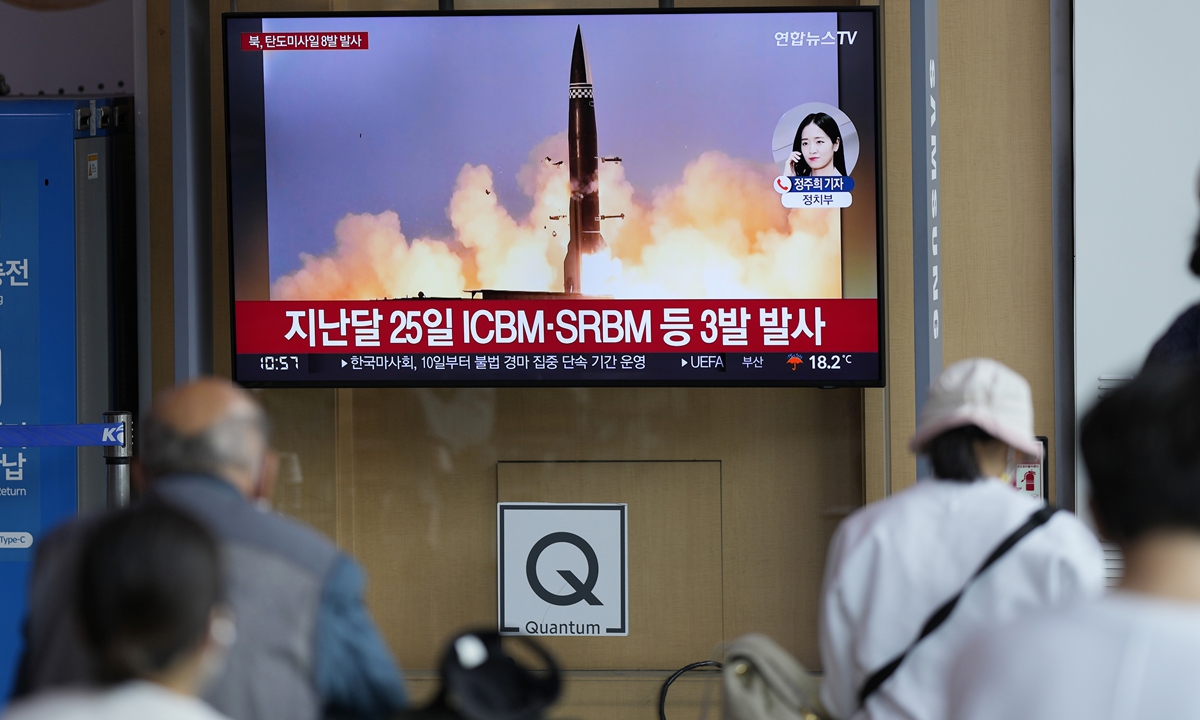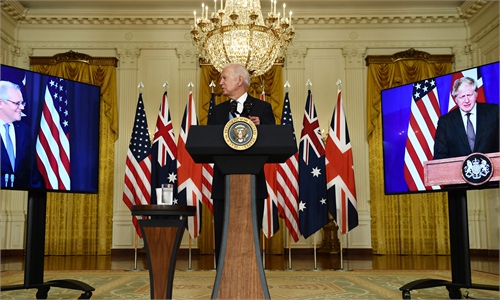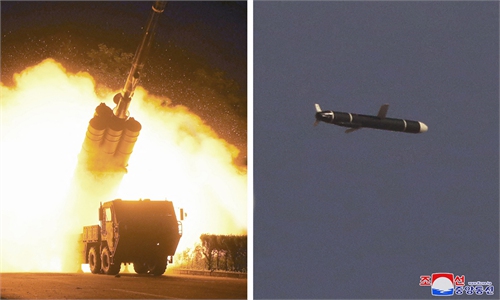China urges calm following missile launches in Korean Peninsula, as US continues to light powder keg

People watch a news report about North Korea's missile launch showing file images at a train station in Seoul, South Korea on June 5, 2022. Photo: VCG
The Chinese Foreign Ministry on Monday called on all sides to remain calm and avoid actions that may aggravate tensions, after recent frequent missile launches by North Korea, South Korea and the US. Chinese experts said Washington, which wants to turn China's neighborhood into a "powder keg," is the worst culprit of increasing tension on the Korean Peninsula, and China will not sit idly by.
In the early morning on Monday, South Korea and the US fired eight ground-to-ground ballistic missiles into the Sea of Japan, which South Korean media said was in response to North Korea's missile launches on the previous day.
North Korea reportedly launched eight short-range ballistic missiles from four different locations into the Sea of Japan on Sunday, South Korea's Yonhap News Agency reported, quoting the country's Joint Chiefs of Staff. However, the operation was not reported by North Korean media.
According to Yonhap News Agency, North Korea's reported missile launch may be a protest against the three-day joint carrier battle group exercises of South Korea and the US last from June 2 to 4. South Korea's JCS said on Saturday that it is the first time that South Korea and the US have mobilized nuclear aircraft carriers for a joint military exercise since November 2017.
Chinese Foreign Ministry spokesperson Zhao Lijian said on Monday that China's position has always been clear, which is to maintain peace and stability of the Korean Peninsula and to promote the political settlement process on the peninsula. This is in the interests of all parties, Zhao said.
"Under the current situation, we hope that all parties concerned will remain calm and restrained and avoid any action that may aggravate tensions," he said.
Since Yoon Suk-yeol took office as South Korean president, the standoff on the peninsula has worsened, analysts said. The reported latest launch was Pyongyang's third since Yoon took office and the 18th in 2022. Interestingly, during the last South Korea-US joint military exercise under the Moon Jae-in administration in April, there was no tit-for-tat response, and Yonhap called it a "rare silence."
The US, which has instigated the new South Korean government to take a hard line toward North Korea, is the worst culprit of the rising tensions, Lü Chao, an expert on the Korean peninsula issue at Liaoning University, told the Global Times on Monday.
He noted that the latest joint military exercise, which was held after Biden's visit to South Korea, has changed from a computer-based simulation for the past four years to a field military exercise, which is clearly the direct cause of escalating tensions.
The last US-South Korea military exercise on field was in 2018 and involved tens of thousands of troops, the Wall Street Journal reported.
South Korean President Yoon Suk-yeol, who took office last month, has promised to take a tougher line against North Korea when meeting with Biden in Seoul in May, agreed to upgrade joint military exercises and joint deterrence posture, media reported.
"For a period of time, the US has been conducting frequent military exercises with South Korea and Japan. In response, North Korea launching multiple missiles at once in this test launch demonstrates a saturation attack capability that is highly operational," military expert Song Zhongping told the Global Times on Monday.
"The situation on the Korean Peninsula continues to be tense as a direct result of the military and political distrust between the US and North Korea," he said. "South Korea has followed the US strategy and policy to restrain North Korea, leaving no sign of peace on the Korean Peninsula."
The Biden administration has no intention to negotiate so far over the Korean Peninsula, proposing conditions that are all unacceptable to North Korea. South Korea's attitude is also very tough, even reactivating the Kill Chain system that was abolished during the Moon Jae-in era, posing another serious threat to North Korea, he noted.
Under such circumstances, it is reality that North Korea cannot be guaranteed security, so it feels it has to defend itself with nuclear weapons and missiles, said the expert.
Observers noted that the heating up of the situation in regions near China is just part of the US global strategy to contain China. The situation on the Korean Peninsula has a direct bearing on China's neighborhood security, and China will never sit idly by and watch the US attempt to turn China's neighborhood into a powder keg.
"The US is fostering countries to fight proxy wars over and over again, while constantly making threats and creating trouble against Iran, North Korea and other countries," Song said. "The US has already made a mess of Europe by spreading the Russian threat theory, and now it is spreading the China threat theory and the North Korea threat theory in the Asia-Pacific region in the hope of uniting its allies in the region."
The US is even willing to create instability around the world as long as the North American continent is safe, Song said.
"That way, the US can become the so-called global leader and US arms dealers can make a fortune in wars and also make other countries to fight against US adversaries, which is exactly what the US wants."
In May, Chinese ambassador to the United Nations Zhang Jun criticized the US for using the Korean Peninsula issue a card for its "Indo-Pacific Strategy," after China and Russia vetoed a US-led UN Security Council resolution which was to toughen sanctions on North Korea over its intercontinental ballistic missile (ICBM) launches.



